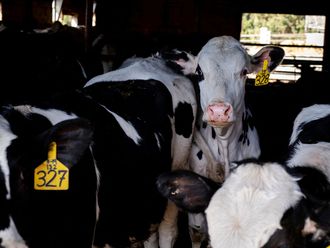Miami: She has lived in the shadows for 14 years, fearing deportation.
But now Bertha Sanles of Nicaragua is jubilant over President Barack Obama’s executive order shielding her and up to four million other undocumented foreigners from expulsion and letting her apply for a three-year work permit.
“You know what I feel? That I want to scream and say, ‘now, I can fly. I can do so many things,’” Sanles said after the president’s national televised speech.
“I feel like I am someone,” said Sanles, who makes a living cleaning other people’s houses in Miami and lives in an apartment with her husband, two daughters, three dogs and a turtle.
She watched the president’s speech on a large screen TV in the parking lot of an immigration advocacy group headquarters, along with her family and dozens of other undocumented immigrants and activists.
Despite her happiness, Sanles said she is sad for those who have been left out.
Obama’s order applies to undocumented foreigners who have lived in the US for at least five years and have children who are US citizens or legal permanent residents born on or before November 20, the date of Obama’s order.
Sanles is eligible because her daughter Leah is a US citizen.
Her other daughter, Christell, who is 20 and was born in Nicaragua, was able to sign up for the so-called Daca programme — Deferred Action for Childhood Arrivals. It granted temporary residency to people who arrived here before the age of 16.
Despite all her years of living in fear of deportation back to her destitute homeland, Sanles said she never lost hope a day like this would come.
“A lot of bubbles burst. A lot of people stopped believing, but I never lost faith,” she said ahead of Obama’s announcement, as she nervously awaited the president’s plans on immigration.
Now that she can get papers, Sanles said she looked forward to things like getting a driver’s licence, having car insurance in her name and buying a house someday.
“Maybe it will not be tomorrow, but I have that relief,” said Sanles, who is active in a migrant advocacy group called Familias Unidas, or United Families.
Sanles became active when Christell could not complete her studies to be a medical aide due to her status.
‘Walk around in fear’
“It was impossible. She did not graduate,” Sanles said, with tears in her eyes.
Sanles is aware that Obama’s executive orders will mean temporary help, and that a lasting solution will come only with a broader law passed by Congress.
“I understand that it is temporary relief. But you know what is worse? To not have anything, because every day I walk around in fear.”
Sanles was raised by a neighbour because her parents and grandmother died when she was young.
She will waste no time in pushing for definitive reform.
“We have to keep up the pressure,” she said.
Republicans halted in the House of Representatives an immigration reform passed in the Senate in 2013.
That change aimed to set out a path in which the more than 11 million people living in the United States, most of them Latin American, could normalise their status.
“We have to press Congress, especially the Republican lawmakers,” she said.
“We have to focus on them, and let them know that we are here and not going anywhere.”












